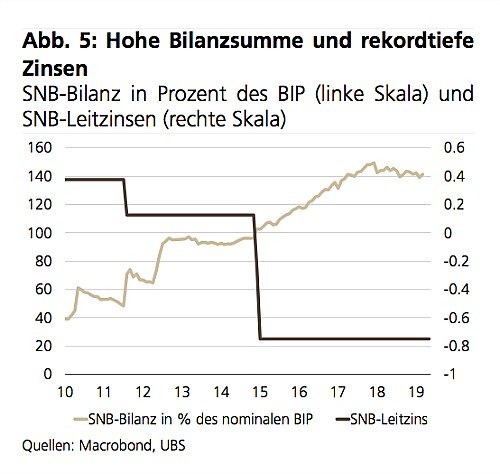U.S. and European policymakers are due to make key monetary calls in coming days. Switzerland's munition is running out, UBS warns.
The European Central Bank convenes next Thursday, and the U.S. Federal Open Market Committee meeting, or FOMC, meets on July 30. Both are expected to relax further: UBS said on Thursday that it predicts an 0.5 percent rate cut. The ECB is expected to lay the groundwork to cut another 0.2 percent later in the year.
This puts Switzerland's central bank under pressure, UBS notes – much more so than other central banks. For one, lower interest rates abroad generally drives up the franc, making life for Swiss exporters difficult. Swiss pension funds and banks are groaning under the heft of charges on holding Swiss francs, or negative interest rates.
It also puts the Swiss National Bank, or SNB, in the uncomfortable position of evaluating which of the few arrows it has left in its quiver it should reach for. «The SNB's ammunition is now getting a bit thin,» UBS said.
Bloated Balance Sheet
With a balance sheet now bloated beyond Switzerland's economic output, as well as rates at a record -0.75 percent, (see graph below), the SNB's room to maneuver is severely limited. Thus, UBS notes that the Swiss will have to be even more sparing in the use of the instruments it has at its disposal.

Unappealling Options
UBS' analysts argue that the SNB under president Thomas Jordan has just three main options left to fire if rates in the world's two most important currencies fall:
- The SNB can step away from intervening in foreign exchange markets to keep the franc down, and simply accept a stronger Swiss currency. The problem: the SNB has hitched its monetary fortunes to that of the ECB; if the Swiss doesn't keep pace now, investors may seek haven in the Swiss franc even more intensely. UBS said it doesn't rule out the franc hitting parity with the euro again (it last happened in 2009).
- Alternatively, the SNB could ease pressure on the Swiss currency by selling francs against the euro. Past forex interventions have proven at least party successful, and only indirectly affect Switzerland's financial system. Their disadvantage is that they don't work over a long period of time. It's going to be difficult for the SNB to continue keeping pace with extremely generous European monetary policy.
- The SNB's third option? It can also lower rates – the strongest weapon the central bank has. The drawbacks are obvious: the instrument is hard to dose and would pressure Switzerland even futher towards the lowest band of interest rates, and hurt the financial system. It would also leave the SNB effectively out of further options.
How Jordan and Co will ultimately respond is clear, but UBS says it expects the SNB to counter a substantial expansion in Europe with one of its own for Switzerland. «If this is the case, the SNB will probably have to think about matching with its own rate cut.»



































